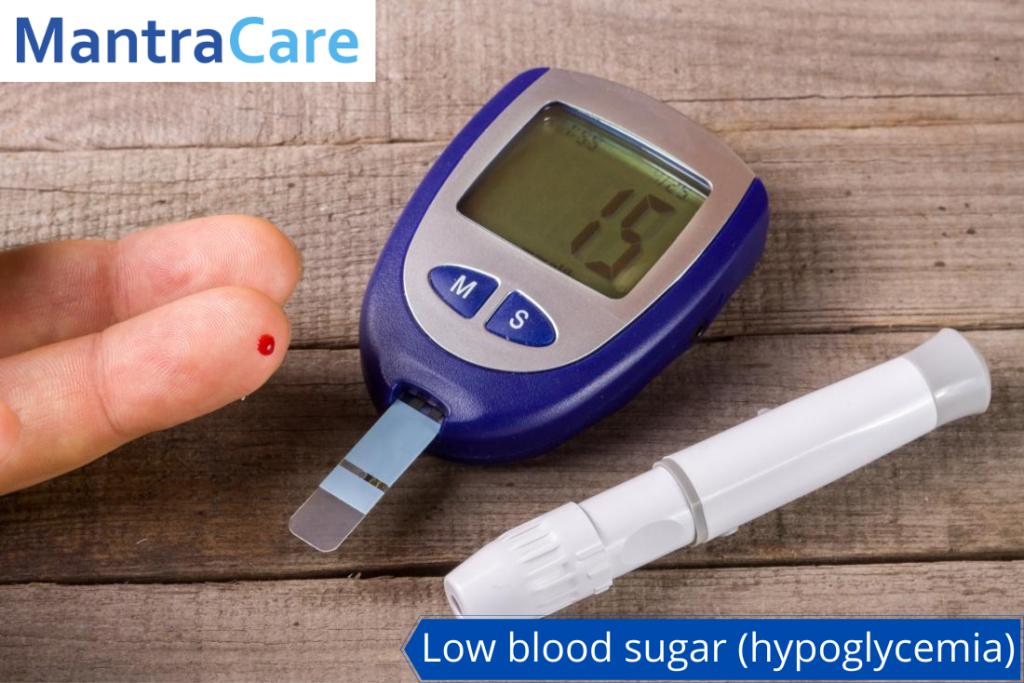Contents
What Is Low Blood Sugar?
Hypoglycemia is also called low blood sugar or low blood glucose level which occurs due to a decrease in the level of glucose in the blood when we consume carbohydrate-rich food, the carbs are then broken down into glucose molecules which are then absorbed by the cells in the blood to produce energy. Glucose is the energy source of your body. People who have diabetes are often at risk of having hypoglycemia as they must cut off some amount of carbohydrates from their diet to maintain normal blood glucose levels. People who have other health conditions may rarely get low sugar levels.
Hypoglycemia may occur due to your diabetic medicine. The insulin produced with the help of the medicine may not match the diet you are taking leading to low blood sugar levels. It is important to take the appropriate amount of carbohydrates to match the effect of diabetic medicine. People who have type 1 diabetes are at higher risk of getting hypoglycemia. When your sugar levels drop to a below-normal level then it requires immediate treatment. For different people, different levels of blood sugar may be low. For somewhat may be normal, would be low sugar for others. Usually below 70mg/dl is considered as a low blood sugar level but you should get yourself checked by your healthcare provider before taking any treatment.
Signs And Symptoms Of Hypoglycemia
The reaction of the Hypoglycemia present in the body differs from person to person and the symptoms may also vary. The symptoms may appear in the milder form first and if left untreated they can turn into severe signs and symptoms.
Mild Symptoms of Hypoglycemia
The milder symptoms include being jittery or shaky, sweaty, hungry, frequent headaches, Blurred vision, excessive tiredness, dizziness, disorientation, being pale, being nervous, facing trouble in concentrating, irregular and fast heartbeats, nausea, feeling sleepy, and clumsiness.
Severe Symptoms of Low Blood Sugar
If you get seizures and remain unconscious, then it may indicate the severe condition of Hypoglycemia. Some people also witness symptoms like crying out, having nightmares, excessive sweating, feeling tired and confused after waking up. These symptoms generally appear during the night-time when the person is sleeping.
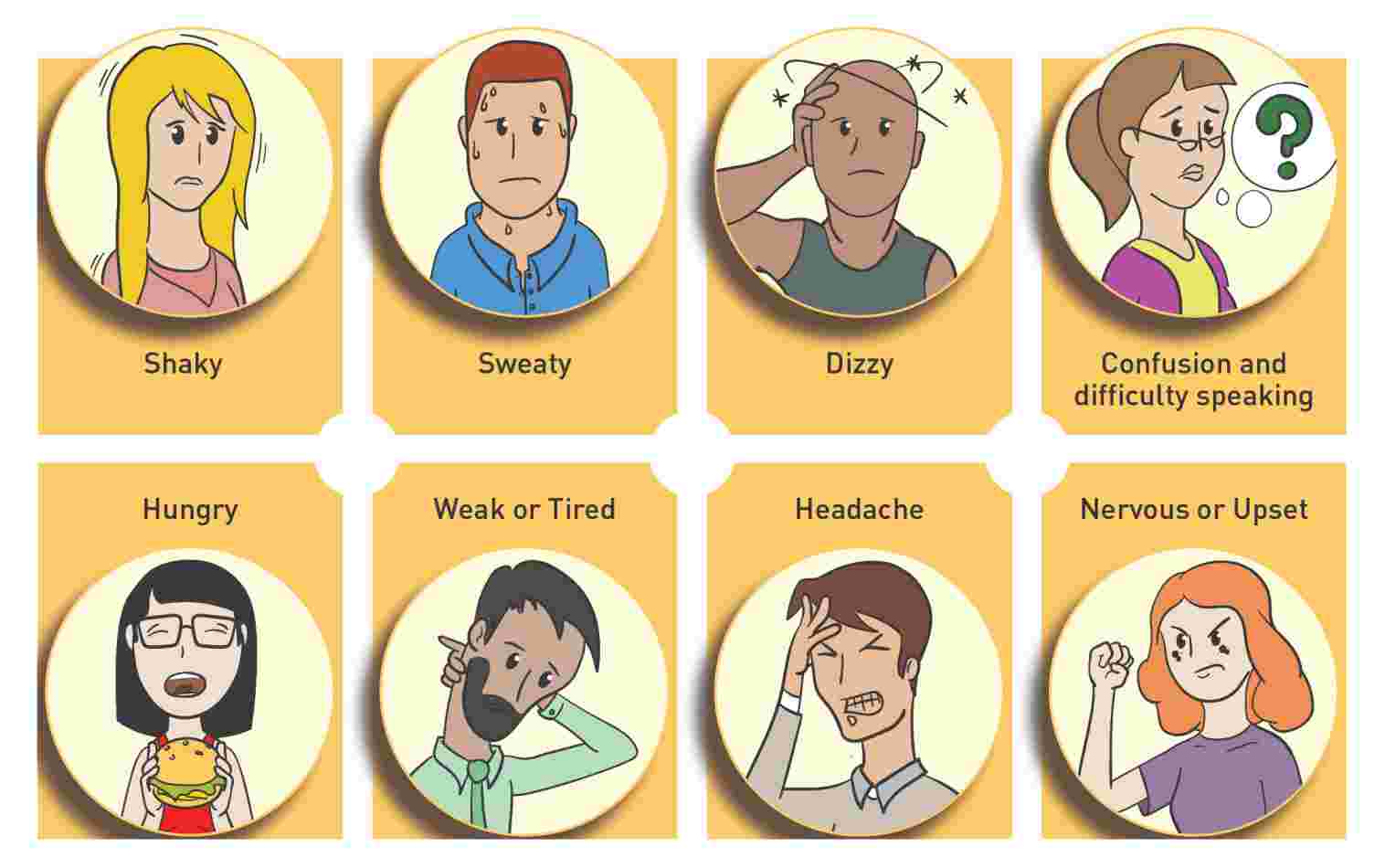
Role of Epinephrine In Low Blood Sugar Levels
Low amounts of sugar in the blood also cause a release of the hormone epinephrine which is also called the fight or flight hormone. Epinephrine is released when the brain senses any danger or stressful situation the body is in. The release of this hormone causes symptoms of Hypoglycemia like being anxious, fast heartbeats, excessive sweating, and tingling sensation in the body. As the blood sugar level continues to drop it hinders the flow of glucose present in the blood.
If an appropriate amount of glucose does not reach the brain then it may cause the functioning of the brain to stop and appear in the form of seizures, unconsciousness, and feeling of disorientation along with blurred vision. In very rare conditions, if the blood sugar level drops and does not get treated on time then it may lead to the death of the patient or would make them stay in the coma.
Low Blood Sugar Monitoring
To make sure the symptoms you are experiencing are due to low sugar level is to monitor your sugar level as quickly as possible. If you do not have a machine with you that checks the blood sugar level, then treat the hypoglycemia and note whether there is any change in your condition or not. If there seems to be no improvement, then go to the nearest healthcare provider for further treatment.
Causes of Hypoglycemia
There are various causes of the low sugar level, but it is common for people who have type 1 diabetes or type 2 diabetes. An average person might encounter two episodes of low blood sugar level each week which might be accompanied by other symptoms. There might be episodes of low blood sugar in which symptoms might not appear. The most common cause of having low blood sugar level is high levels of insulin, inappropriate diet, and excessive physical activity.
Insulin Injections
Insulin is being injected or given in the form of medicines to diabetic patients. Patients who have diabetes tend to have low amounts of insulin in their bodies. Insulin helps in the absorption of glucose from the food to reach the cells for energy generation and to carry out other cell activities. Accumulation of glucose in the bloodstream due to the absence of insulin can cause an increase in the blood sugar level. Insulin injection is given to ensure that their blood glucose level does not rise from the normal level.
Injecting the wrong type of insulin, overdose of insulin, or injecting insulin directly to the muscle rather than injecting into the skin can cause low blood sugar levels. If after taking the medicine, you do not eat the food according to your diet plan or do more exercise than you normally do then it may cause the blood sugar level to drop. A medical condition of the pancreas can also lead to the production of excess amounts of insulin in the body causing low blood sugar levels. This condition is generally caused due to tumour formation in the pancreas or the cells that produce insulin become enlarged leading to the release of excess amounts of insulin.
Food Habits
Hypoglycemia can be caused due to absence of certain nutrients in your diet or the skipping of meals. In some cases, food contains products that cause low blood sugar levels. Such type of hypoglycemia is considered reactive or postprandial hypoglycemia. And can occur in people who have had surgery on their stomachs. Carbohydrates are an essential component of your diet and they release glucose in the bloodstream when they are broken down into small molecules.
The high amount of carbohydrates present in the diet of a diabetic patient can cause a spike in Hypoglycemia but if the amount of carbohydrates is considerably low in the diet then it can cause low blood sugar levels.
The diet plan should have an appropriate amount of other nutrients also to facilitate the absorption of carbohydrates in the blood. Change in the number of other nutrients like fats, fiber can affect the rate of absorption of carbohydrates causing a decrease in the blood sugar level. Hypoglycemia can also occur if you have not eaten anything for a long duration of time or are skipping meals.
According to the intake of the food and nutrients present in them, the doses of insulin should be regulated. For less amount of carbohydrates in the diet, it is necessary to have a small dose of insulin and vice versa. Drinking too much alcohol without consuming enough food also leads to difficulty in controlling the blood sugar level of your body. Alcohol consumption can cause severe hypoglycemia.
Lack of Physical Activity
Physical activity is necessary to maintain a good level of blood sugar level. Living an active lifestyle helps diabetic patients to control their blood sugar level and prevent it from rising. Daily some amount of exercise or physical activity is necessary for diabetic patients.
But if they increase their physical activity suddenly then it causes a decrease in the blood sugar level. The intensity, duration, and timing of the exercise are the factors that cause low blood sugar levels. Only exercising and not eating enough food also causes hypoglycemia within 24hours of exercise.
Other Causes
Some critical illnesses of the liver (hepatitis or cirrhosis) can cause hypoglycemia. Disorders of the kidney are also responsible for hypoglycemia as the excretion of medicines may not take place in a proper manner which may affect glucose present in the blood and can cause accumulation of medicines along with glucose. Long-term starvation or the condition of anorexia also causes a decrease in the blood sugar level.
Certain diseases lead to the deficiency of hormones that are responsible for the regulation of glucose production and can cause hypoglycemia. Hypoglycemia needs to be treated as soon as the symptoms are visible. If left untreated it can cause seizures and loss of consciousness in serious conditions. In some cases, it may lead to the death of the person. In adults, it may cause dementia and dizziness.
Food To Eat When Blood Sugar Is Low
If you are feeling symptoms of low blood sugar then check the level and according to different blood sugar levels, there are different food items that can be consumed by you.
Food For Above-Normal Blood Sugar
If your blood sugar level is above normal but you experience symptoms of hypoglycemia then you should eat natural peanut butter which has no added sugar. Pure peanut butter without any added sugar is filled with fats and protein which helps in curing the symptoms of hypoglycemia without causing an increase in the blood sugar level. You can consume peanut butter along with starch-containing food items like crackers. The amount of starch present in the crackers can increase the blood sugar level slightly and the fats and protein present in the butter would prevent a sudden spike in the blood glucose level. Thereby, maintaining a proper balance of blood sugar level.
Food For Hypoglycemia
If your blood sugar levels drop to a range of 50-70mg/dl then you should eat raisins, bananas, grapes, dates, applesauce, and pineapple. These fruits contain a good amount of sugar in them but also have fiber present in them which causes a gradual increase in the sugar level. These food items would effectively increase blood sugar levels alleviating the symptoms of hypoglycemia.
Food For A Severe Drop In Blood Sugar Level
If your blood sugar level drops to less than 55 mg/dl then either have grape juice or some amount of honey or maple syrup. Consuming liquid having a high amount of carbs and a minimal amount of fat, protein and fibre are good for providing a rapid action to Hypoglycemia. If you have severe hypoglycemia then consume grape juice as it has the highest amount of carbohydrates present in them.
You should consult your healthcare provider before consuming the above-mentioned food and should work out a proper precautionary diet plan with your health instructor.
Hypoglycemia Action Plan
Testing Blood Sugar Level
If you experience low sugar levels it becomes necessary to measure the blood sugar level immediately. If your sugar level is less than 70mg/dl then it would be considered hypoglycemia. But for every other person, this number varies which needs to be confirmed by the healthcare provider.
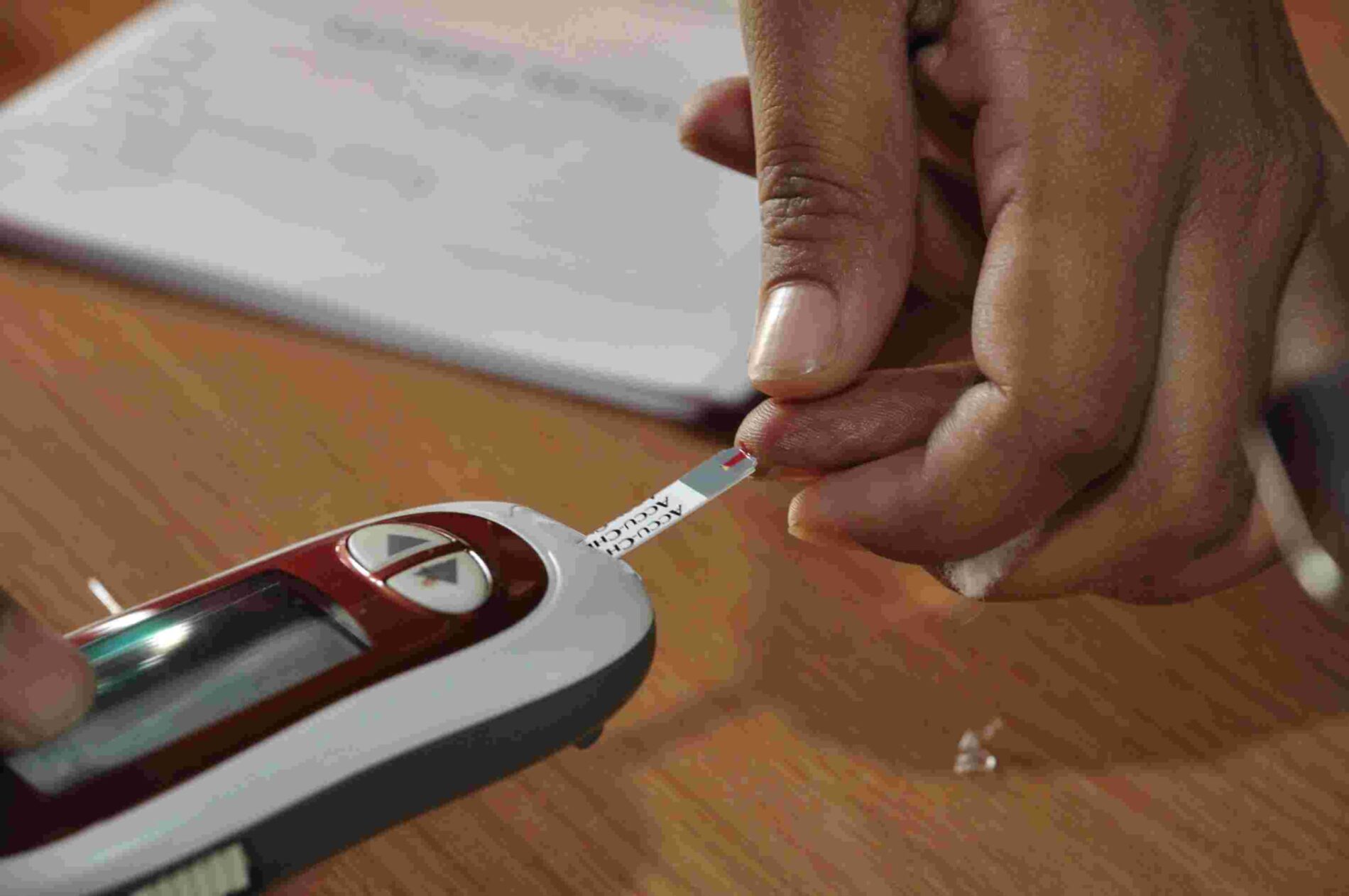
15-15 Rule
In this rule, if you have a low sugar level then you need to take about 15gms of carbohydrates and then have to wait for 15 minutes so that it can act on the blood sugar level. If there is no increase in the blood sugar level then you have to repeat the steps till the sugar level becomes normal.
For 15gms of carbohydrates you can consume half cup of orange juice(pure), half cup of regular soda, 1tsp of sugar, honey or maple syrup dissolved in water, 5-6 jelly beans or gummy bears, 1tsp of cake frosting, 2tsp of raisins, half cup of applesauce or 4 glucose tablets. If you have diabetes then you should consume prescribed glucose tablets.
After consuming one of these food items if after 15 minutes your sugar level has reached 100mg/dl then you do not need to repeat the process. But if not then you need to repeat the process till it reaches the desired level.
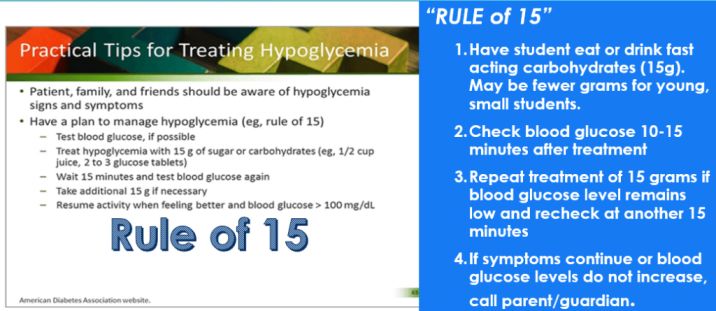
Consumption of Protein
After your blood sugar gets back to normal it is important to have some amount of protein to keep the sugar level in the normal range. This can be achieved by consuming a sandwich with ham or turkey or having any other protein-rich food.
Necessary Precautions
If you are not able to revive the blood sugar level then you need to visit a healthcare provider immediately. It is important to have a kit that contains your action plan, glucose tablets, and glucose meter so that if you are not being able to help yourself, your family can help you out by reading the action plan. It is also important to teach your family members about the condition and how to inject glucagon shots in severe conditions.
The glucagon shot is taken so that the liver can release the stored glucose and the blood sugar level can be brought to a normal level naturally. Seek medical help when necessary a prolonged period of low sugar level can cause irreversible damage and in some cases it also causes death.
Hypoglycemia Unawareness
It often occurs that people who have hypoglycemia do not have any symptoms of low blood sugar or their intensity is so mild that they do not notice them. This condition is known as hypoglycemia unawareness. People who have this condition often find themselves unable to recognize the symptoms of low blood sugar and leave it untreated.
It can increase the risk of getting further complications of low blood sugar level and a healthcare provider might find it difficult to revive the sugar level. Such people need extra care so that they can identify the symptoms easily and early for proper treatment.
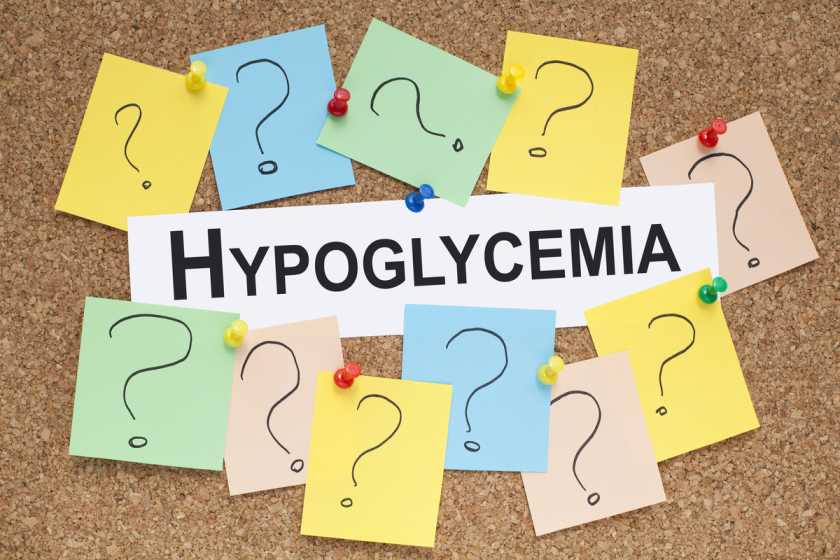
What To Do In Hypoglycemia Unawareness?
If you have hypoglycemia unawareness then keep a glucose monitoring device with you always. This machine checks the blood glucose level regularly at different intervals of the day and night. It has an alarm that goes off when your sugar level drops drastically. It can also wake you up from sleep if you get a low sugar level during sleep.
If you manage to avoid hypoglycemia for several weeks then you may regain the initial warning signs that your body gives when you have a low sugar level. This would enable the body to relearn the reaction towards low blood sugar levels. In some cases, you might get a high amount of A1C but this is a temporary rise in the blood glucose level.
Precautions For Low Blood Sugar Level
People who have hypoglycemia should always look out for the early signs given by the body. For precaution:
- Check your blood glucose level regularly at different intervals of day and night.
- Have a good diet plan which would contain ample amounts of carbohydrates.
- Excess carbohydrates can also be bad as they give a spike in the sugar level-so the correct amount of carbs consumption is essential.
- Before and after physical activity check your blood sugar level and adjust your carbohydrate consumption accordingly. Sugar level generally drops after exercise and during nighttime when you are asleep.
- Learn from your healthcare provider about balancing your medicines, eating plan, exercises, and insulin doses to prevent hypoglycemia.
Better management of the disease and diabetes can reduce the risk of getting complications from hypoglycemia.
A Word From MantraCare
Do you want to get rid of diabetes? Join our online diabetes consultation program and reverse your Diabetes naturally through lifestyle changes such as a Personalized Diet plan, Exercise, dieticians, and health coaches.
